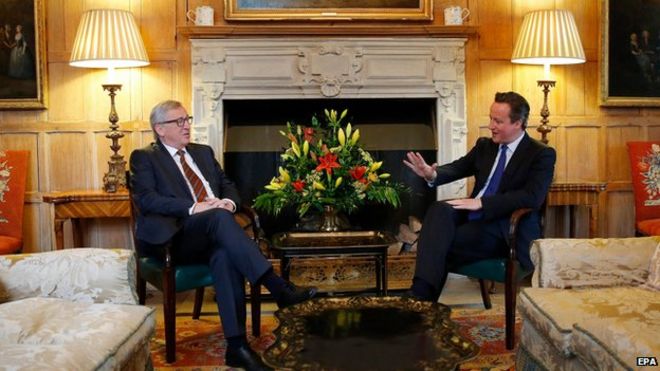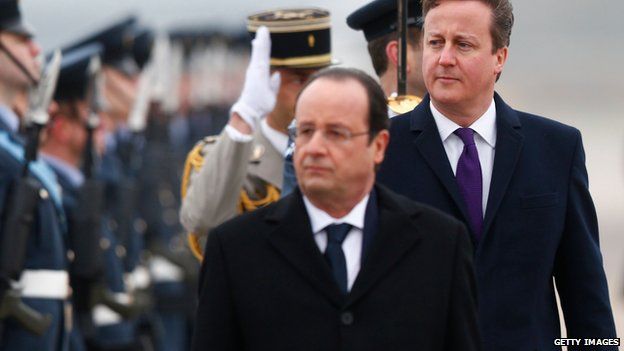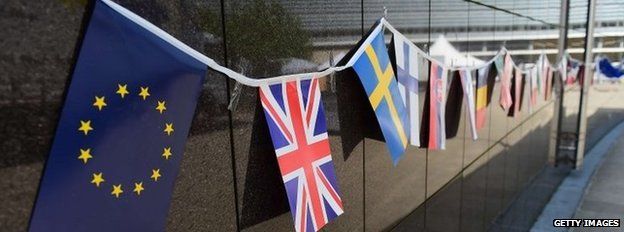PM tells EC president Britons 'unhappy with status quo'
PM tells EC president Britons 'unhappy with status quo'
- 1 hour ago
- UK Politics

David Cameron has told European Commission President Jean-Claude Juncker that "British people are not happy with the status quo" in Europe.
The prime minister hosted Mr Juncker at Chequers ahead of a week of efforts to renegotiate Britain's EU membership.
The EC president "reiterated that he wanted to find a fair deal for the UK", said a No 10 spokesman after the talks.
The meeting came as reports suggest France and Germany are planning to announce further eurozone integration.
French newspaper Le Monde is reporting that the two countries have agreed a deal to bring about closer political union between eurozone countries without the need for changes to the treaties which govern the EU.
Earlier, No 10 confirmed UK-based citizens from most EU countries would not get a vote. The eligibility rules will be broadly the same as for a general election, rather than for local or European polls.
Mr Cameron has promised to hold an "in-out" referendum by the end of 2017.
'Fair deal'
The talks between Mr Cameron and Mr Juncker on Monday focused on "reforming the EU and renegotiating the UK's relationship with it", the No 10 spokesman said.
"The prime minister underlined that the British people are not happy with the status quo and believe that the EU needs to change in order to better address their concerns.
"Mr Juncker reiterated that he wanted to find a fair deal for the UK and would seek to help.
"They talked through the issue at some length in the spirit of finding solutions to these problems. They agreed that more discussion would be needed, including with other leaders, on the best way forward."

The men also discussed the Greek economic situation, as well as Ukraine and sanctions against Russia, Downing Street added.
Eurosceptics from within Mr Cameron's own party and outside it have suggested significant renegotiation could be impossible without treaty change, but Mr Juncker has made clear his opposition to any such change.
'Worthless'
One senior Conservative backbencher, Bernard Jenkin, told BBC Radio 4's Today programme the Le Monde leak "went to the heart" of what the prime minister's promised renegotiation was about.
"What is the relationship that the UK is going to have with our European partners, given that most of our European partners want to be in the eurozone and carry on with the process of integration?" he asked.
"The treaties aren't designed to allow different states to do different things. It is all assumed that we will all be involved with integration."
UKIP MP Douglas Carswell said before the meeting that the prime minister's promised renegotiation would be "more or less worthless".
He added: "We now know he's not seeking treaty change and none of the new deal that he is looking for will apply specifically to Britain... none of it is going to fundamentally change our relationship with Europe."
Over the coming days, Mr Cameron will travel to France, Germany, Denmark, Poland and the Netherlands to hold talks with European leaders.
And on Thursday, legislation on the voting eligibility for the referendum will be introduced to Parliament via the EU Referendum Bill.
'Big decision'
The bill will make clear the franchise will follow broadly the same rules as the general election:
- British, Irish and Commonwealth citizens over 18 who are resident in the UK will be eligible to vote
- So too will UK nationals who have lived overseas for less than 15 years
- The franchise will not include 16 and 17-year-olds, unlike the Scottish independence referendum
- Members of the House of Lords and Commonwealth citizens in Gibraltar will also be allowed to vote, although they cannot participate in general elections
- In total, about 45.3 million people will be able to take part
A No 10 source said about the franchise: "This is a big decision for our country, one that is about the future of the United Kingdom. That's why we think it's important that it is British, Irish and Commonwealth citizens that are the ones who get to decide."
Eurosceptics have previously claimed that as many as 1.5 million people from other EU countries could have been allowed to vote in the referendum, if it had taken place under the rules for local government elections.

EU referendum in focus

David Cameron is ready to start renegotiating the terms of Britain's EU membership ahead of a referendum. Here is some further reading on what it all means:
Comments